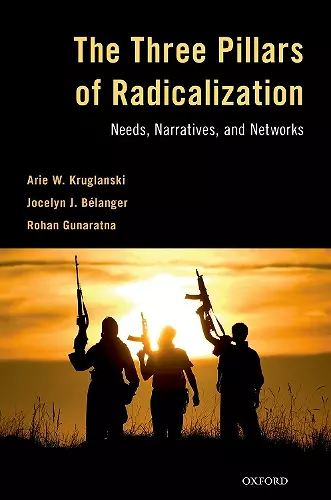The Three Pillars of Radicalization
Needs, Narratives, and Networks
Arie W Kruglanski author Rohan Gunaratna author Jocelyn J Bélanger author
Format:Hardback
Publisher:Oxford University Press Inc
Published:13th Jun '19
Currently unavailable, and unfortunately no date known when it will be back

What fuels radicalization? Is deradicalization a possibility? The Three Pillars of Radicalization: Needs, Narratives, and Networks addresses these crucial questions by identifying the three major determinants of radicalization that progresses into violent extremism. The first determinant is the need: individuals' universal desire for personal significance. The second determinant is narrative, which guides members in their "quest for significance." The third determinant is the network, or membership in one's group that validates the collective narrative and dispenses rewards like respect and veneration to members who implement it. In this book, Arie W. Kruglanski, Jocelyn J. Bélanger, and Rohan Gunaratna present a new model of radicalization that takes into account factors that activate the individual's quest for significance. Synthesizing varied empirical evidence, this volume reinterprets prior theories of radicalization and examines major issues in deradicalization and recidivism, which will only become more relevant as communities continue to negotiate the threat of extremism.
The book is not only comprehensive in its scope, it is a pioneering work in that it breaks new ground in understanding radicalization and charts the way for making de-radicalization programmes more effective. * Adil Rasheed, Strategic Analysis *
This impressive co-authored study presents a novel approach to analyzing processes of radicalization and de-radicalization as well as the prevention of recidivism. The explanation combines individual motivation based on a need for significance, exposure to an ideological narrative that justifies violence, and membership in a supportive social network that validates the individual's choice. The authors ground their argument in wide-ranging evidence from questionnaires, surveys, and interviews. The book contributes enormously to our understanding of violent extremism in the contemporary world. * Martha Crenshaw, Professor and Senior Fellow, Freeman Spogli Institute for International Studies and Center for International Security and Cooperation, Stanford University *
This important work, based on rare empirical field research with violent extremists and at risk populations, offers not only the most comprehensive psychological analysis to date of factors that drive radicalization and deradicalization, but also offers clear guides as to best practices and policies for preventing and reversing radicalization. In my operational experience in Iraq, Afghanistan, and later as President Obama's Special Envoy to the Counter ISIL Coalition, I would have benefited significantly from this research. I consider it a must read for all those engaged in the war of ideas, and committed to fighting this pernicious and impending global threat * John R. Allen, General, US Marine Corps (Ret.), former Commander, NATO ISAF and U.S. Forces Afghanistan (2011-2013) and Special Presidential Envoy to the Global Coalition to Counter the Islamic State *
This deeply researched international study is a major contribution to understanding the roots of radicalisation, one of the most serious security challenges of today. * Lord Jonathan Evans, , KCB, DL and Director General, British Security Service (2007-2013) *
This book is a welcome antidote to the common misconception that the brutally violent tactics of terrorist groups like ISIS and al Qaeda can only be understood as pathology. The authors offer a convincing argument that terrorist violence is the flip side of normative and even altruistic behavior: a tragic juxtaposition of the compelling individual need to seek personal significance joined with an ideological argument that prioritizes violence and a reference group to provide validation. * Gary LaFree, Chair of the Department of Criminology and Criminal Justice and the Founding Director of the National Consortium for the Study of Terrorism and Responses to Terrorism (START), University of Maryland *
A fine work that uses case studies and profiles from across the world to reveal, through accumulated empirical evidence and statistical models, the drivers and pathways to radicalization. The authors soundly argue that the scourge of Islamic extremism is far from over, and that its ultimate defeat requires interventions to reconfigure the intimate links between social networks and ideological narratives into alternative routes to personal significance that transcend mere material opportunities. * Scott Atran, Emeritus Director of Research in Anthropology, National Center for Scientific Research, France, Founding Fellow, Centre for the Resolution of Intractable Conflict, University of Oxford, and Research Professor of Psychology and Public Policy, University of Michigan *
ISBN: 9780190851125
Dimensions: 239mm x 163mm x 23mm
Weight: 476g
272 pages